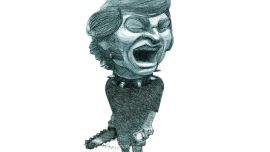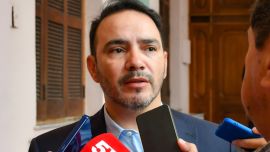Argentina’s lower house is expected to approve a bill to introduce a one-off capital levy on more than 9,000 of the country’s wealthiest citizens this morning.
The proposal, backed by President Alberto Fernández’s government, will see individuals with more than US$2.5 million in assets make an “Extraordinary Solidarity Payment,” paying a one-off levy. State coffers running low amid the coronavirus pandemic and officials are hoping the tax could rake in upwards of US$3 billion.
The so-called "wealth tax" or “millionaire’s tax” bill – which the opposition criticised as "confiscatory" – looks to have the necessary support to pass through the lower house. It will face a tougher time in the Senate, which will likely consider it before the end of the month, with the Frente de Todos coalition needing allies to support it.
Lawmakers opened debate on Tuesday, with pro-government deputies highlighting its potential benefits and underlining that the funds would be ringfenced for health improvements and efforts to boost employment.
"The level of concentration of wealth, in a few hands, is so strong that this contribution falls on less than 0.02 percent of the population,” said government deputy Fernanda Vallejos during debate. “About half of what is collected will be contributed by only 252 people, those who are at the top of the pyramid.”
The one-time contribution will apply to individuals whose declared assets exceed 200 million pesos (US$2.35 million), with a progressive rate of up to 3.5 percent for assets in Argentina and up to 5.25 percent on goods outside the country.
It is estimated that between 9,000 and 12,000 people fall into that bracket in Argentina, a country with 40.9 percent of its 44 million inhabitants currently living in poverty. Unemployment stands at just over 10 percent, with the economy still yet to overcome a recession that began in 2018. Amid the coronavirus pandemic, things have only worsened.
The government hopes that the levy on large fortunes will help strengthen its fiscal outlook. Over the past eight months, the Fernández administration has allocated millions of dollars in aid to the private sector to alleviate the economic impact of the lockdown imposed to tackle the advance of the coronavirus, while raising social support payments for workers in the informal economy.
Argentina has recorded 1.3 million confirmed cases since the start of the outbreak, with more than 35,000 fatalities.
Government supporters took to the streets on Tuesday to show their support for the bill, with militant Peronist groups leading caravans of vehicles and marches on foot to Congress.
Support and rejection
Juntos por el Cambio says it rejects the initiative, describing the idea as "confiscatory." As debate got underway on Tuesday, deputies from the opposition coalition called on their peers to vote it down.
"Argentina already has many taxes and very high tax evasion. Instead of creating new taxes, what must be done is the efficient collection for those that exist," said opposition lawmaker Álvaro González.
"The opposition is looking for arguments that go against the objective of this bill,” countered Peronist deputy José Luis Ramón. “They say that it is a tax but it is an extraordinary contribution and only this one time, due to the pandemic."
The business sector is also divided against the law. Generally, chamber groups and large firms reject the initiative, while small- and medium-sized businesses are more likely to back it.
"The bill will end up decapitalising companies that invest, produce and sustain employment in a health emergency context," complained the powerful Argentine Industrial Union.
The contribution is for individuals with large fortunes and will not be imposed on companies.
Details
The bill lays out that the “extraordinary contribution” will be a one-time measure and it indicates where the funds will be sent and what they will be used for. For example, it names development and production programmes for small and medium-sized businesses (SMEs), education projects and student scholarships, as well as the purchase of medical equipment.
It establishes that 20 percent of what is raised from the levy will be used for medical supplies to attend the Covid-19 health emergency, with another 20 percent designated for SMEs, 15 percent for social development programmes, 20 percent for student scholarships and 25 percent for development programmes related to natural gas.
The law provides for higher rates for assets located abroad, but offers relief for those who decide to repatriate them in whole or in part.
Argentina’s economy has been in recession since 2018. According to estimates by the International Monetary Fund (IMF), GDP will contract by 11 percent this year.
– TIMES/AFP


























Comments